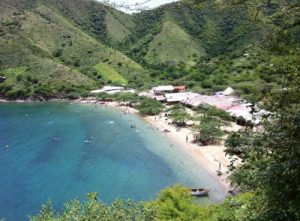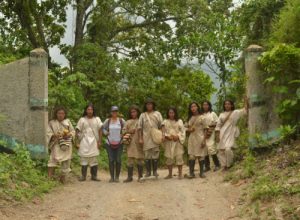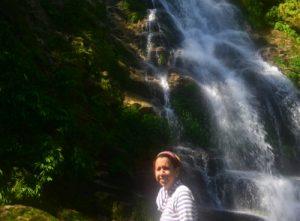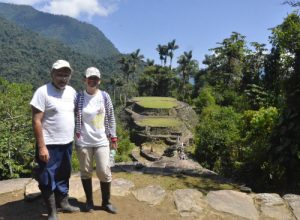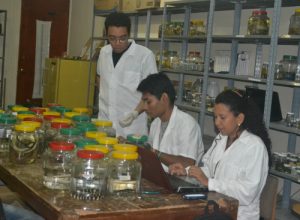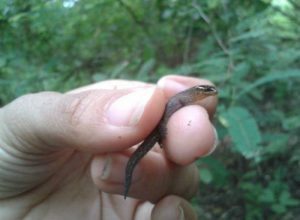To understand the impact of the Covid-19 pandemic on field conservation we spoke to Liliana, a Segré-EDGE Fellow from Colombia. For the past two-years Liliana has been working to conserve the very small and secretive, Colombian dwarf gecko (Lepidoblepharis miyatai), in Santa Marta in the north of the country. But, since Colombia went into lockdown in March all of her fieldwork activities have ground to a halt. Lili explained to us the impact of the pandemic so far and what she does to keep motivated.
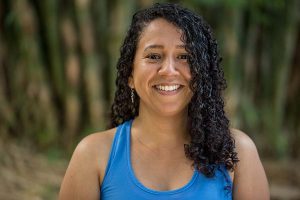
Where are you right now? Country, region, town etc. And what location, home/field station etc.
I’m in Bogotá, Colombia’s capital city. In my country the government declare mandatory quarantine and I’m currently in lockdown at home with some of my family.
What is the current situation in Colombia?
The first recorded case of Covid-19 was detected in early March. After that, the cases began to increase and on March 15th the Colombian government decided to suspend all academic activities in schools, public and private universities in the country. Shortly after this the President announced a full countrywide lockdown to prevent the spread of the virus. Some industries like construction and manufacturing have been allowed to mobilise under strict regulation, but the lockdown still remains for all the other sectors. Air and land traffic are suspended, only the movement of food and essential products are allowed. People who are in the city of Bogotá, which is where the highest number of Covid-19 cases and deaths have been registered, are not allowed to move to other municipalities or cities.
Before the pandemic what did your average day look like?
I usually split my activities between my EDGE conservation project and my work at Pontificia Universidad Javeriana University, where I am a PhD student. In the morning I get up early to prepare breakfast and lunch and head over to the University office to write reports, prepare information for field trips, or schedule activities related to my PhD thesis or EDGE project on the tiny Lepidoblepharis miyatai, or ask I refer to it ‘Lepi’! Outside the office I ride my bike around the city, exercise outdoors and take part in team sports. I frequently travel to the city of Santa Marta, where my project takes place, to conduct field trips and visit the communities to undertake interviews and surveys for my EDGE project.
What is your average day now?
Very different! I have had to turn my room into an office. Generally the first thing I do every day is organise and tidy my work space, have breakfast and start tasks that almost always consist of meetings via Skype or Zoom, answer emails, work on scientific articles, and process data. This month I have conducted an interview with the communication office of Tayrona National Park to update them on the Lepi project. I try to exercise daily, but you have to get creative to stay healthy! Playing keepy uppy with a toilet roll keeps me and my family very entertained and fit!
Can you explain some of the challenges you are facing when it comes to delivering conservation during lockdown?
The main challenge relates to all field activities. For the Lepi project, activities such as field trips to collect ecological or taxonomic information, or meetings with schools or communities have been suspended, we can not enter any National Parks and all schools are closed. In addition, any activity that requires people coming together is prohibited which rules out any workshops or stakeholder engagement.
What challenges are you facing from a personal point of view?
The main challenge has been adapting to this new remote working situation. As well as enforcing a routine of hand cleaning and double checking everything when I go out to buy food. I am used to moving around a lot during the day, whether I am in the city of Bogotá or in the city of Santa Marta, doing field trips, visiting friends, or riding a bike – which I really miss! Being at home 24 hours a day forces you to improve the quality of your space to ensure you balance work and your personal life, since you can easily lose track of time undertaking office-related activities and neglecting personal activities and exercise. I do not have a good desk or a working chair so working for many hours sitting in front of the computer has been a challenge!
In terms of my family, I think this situation has allowed us to be more aware of our relationships, whether they live with you or are at a distance. In my case I live in Bogotá with my cousins and brother, but my parents are in Santa Marta, so we maintain communication daily to find out how the situation is in the city and to attend to their needs. I feel happy to be surrounded by my family, without a doubt this whole process has been tolerable thanks to their company. It has bought us closer together.
What are you looking forward to the most when things return to normal?
Go back to the field! Without a doubt, it is one of the things that I long for the most. To be able to resume the activities of the Lepi project and to be out in the forest. Likewise, being able to carry out my normal activities is important, riding my bicycle and visiting friends.
What do you think will change permanently after this pandemic?
The economy and the way we carry out group activities. All countries have found this a very hard process, and in Colombia small, medium-sized companies, and those who are reliant on daily activities to feed themselves and support their families, it has been very serious. Educational institutions are having to evolve, looking at delivering teaching virtually and removing any group activities. It is going to be different world when we come out of this. Despite everything I believe conservation of our countries wildlife and ecosystems remains a priority for the future.
You can follow Lili’s work on Instagram
Lili was selected as the 2020 Segré Species Survival Awardee and will continue to work closely with EDGE as she scales up her project.
